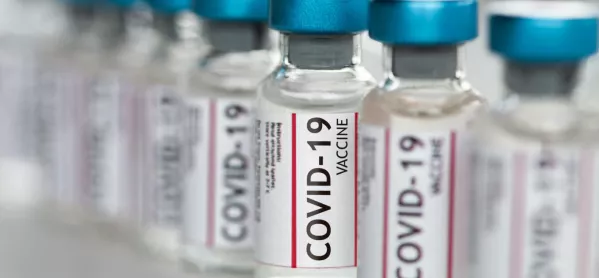Covid vaccine approved for 12- to 15-year-olds

Children aged between 12 and 15 should be offered a first dose of the Pfizer/BioNTech vaccine, the UK’s four chief medical officers (CMOs) have said.
The decision takes into account the impact of the pandemic on children’s education as well as the risks to their mental health from missing school.
The move means that around 3 million students could be eligible for the jab and comes despite the Joint Committee on Vaccination and Immunisation (JCVI) deciding not to recommend mass vaccination of 12- to 15-year-olds.
It is expected that the vaccinations will be given through schools.
More on Covid vaccines for young people:
Schools hit by threatening letters over Covid jab
Gibb: Plan is for Covid vaccine to be given in schools
JCVI won’t recommend Covid jab to younger teenagers
The JCVI said Covid-19 presents a very low risk for healthy children and vaccination would only offer a marginal benefit.
But they suggested that the wider issues, such as education, should be taken into consideration and examined by CMOs.
Reacting to the news, Geoff Barton, general secretary of the Association of School and College Leaders, said: “We welcome the recommendation to offer coronavirus vaccinations to 12- to 15-year-olds as a vital step forward in reducing educational disruption and keeping these young people in the classroom.
“This is particularly important in light of recently published evidence from the Sage [Scientific Advisory Group for Emergencies] modelling group, which warned that it is highly likely that exponential increases in infections will be seen in school-attending age groups in the autumn term. It is crucial that everything possible is done to prevent this from happening and to prevent attendance from once again unravelling.”
Paul Whiteman, the general secretary of the NAHT school leaders’ union, said: “Now that a decision has been made, it is essential that the government immediately confirms that the process surrounding vaccinations will be run and overseen entirely by the appropriate medical teams.
“Where parents have questions, including about important matters such as consent, these must be handled by those same medical teams.
“There must be no delay in confirming this otherwise school leaders will be put in an impossible position of facing questions to which they simply do not have the answers.
“School leaders and their teams need to be able to focus on their core task of providing education to pupils. We would expect detailed guidance to be published by government without delay.”
In their advice to the government, the UK’s CMOs said they were recommending vaccines on “public health grounds” and it was “likely vaccination will help reduce transmission of Covid-19 in schools”.
They added: “Covid-19 is a disease which can be very effectively transmitted by mass spreading events, especially with Delta variant.
“Having a significant proportion of pupils vaccinated is likely to reduce the probability of such events which are likely to cause local outbreaks in, or associated with, schools.
“They will also reduce the chance an individual child gets Covid-19. This means vaccination is likely to reduce (but not eliminate) education disruption.”
The CMOs have asked for the JCVI now to look at whether second doses should be given to children and young people aged 12-15 once more data comes through internationally.
This will not be before the spring term.
The CMOs think a single dose will reduce significantly the chance of a young person getting Covid and passing the virus on.
After seeking advice from a range of experts, including medical colleges, the CMOs said they consider education “one of the most important drivers of improved public health and mental health”.
They added: “The effects of disrupted education, or uncertainty, on mental health are well recognised.
“There can be lifelong effects on health if extended disruption to education leads to reduced life chances.
“Whilst full closures of schools due to lockdowns is much less likely to be necessary in the next stages of the Covid-19 epidemic, UK CMOs expect the epidemic to continue to be prolonged and unpredictable.
“Local surges of infection, including in schools, should be anticipated for some time. Where they occur, they are likely to be disruptive.”
The NHS in England had already been asked to prepare to roll out vaccines for all 12- to 15-year-olds in the event that the CMOs recommend the programme.
The JCVI has already recommended that children and young people aged 12-17 with specific underlying health conditions, and children and young people who are aged 12 years and over who are household contacts of people who are immunocompromised, are offered two doses of a vaccine.
You need a Tes subscription to read this article
Subscribe now to read this article and get other subscriber-only content:
- Unlimited access to all Tes magazine content
- Exclusive subscriber-only stories
- Award-winning email newsletters
Already a subscriber? Log in
You need a subscription to read this article
Subscribe now to read this article and get other subscriber-only content, including:
- Unlimited access to all Tes magazine content
- Exclusive subscriber-only stories
- Award-winning email newsletters
topics in this article



